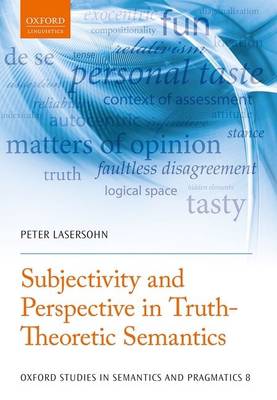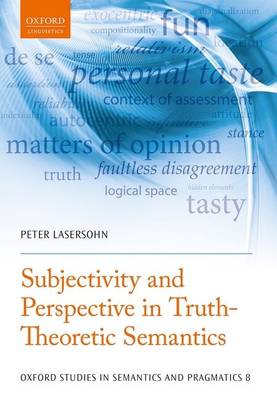
- Afhalen na 1 uur in een winkel met voorraad
- Gratis thuislevering in België vanaf € 30
- Ruim aanbod met 7 miljoen producten
- Afhalen na 1 uur in een winkel met voorraad
- Gratis thuislevering in België vanaf € 30
- Ruim aanbod met 7 miljoen producten
Zoeken
Subjectivity and Perspective in Truth-Theoretic Semantics
Peter Lasersohn
€ 217,95
+ 435 punten
Uitvoering
Omschrijving
This book explores linguistic and philosophical issues presented by sentences expressing personal taste, such as Roller coasters are fun, or Licorice is tasty. Standard semantic theories explain the meanings of sentences by specifying the conditions under which they are true; here, Peter Lasersohn asks how we can account for sentences that are concerned with matters of opinion rather than matters of fact. He argues that a truth-theoretic semantic theory is appropriate even for sentences like these, but that for such sentences, truth and falsity must be assigned relative to perspectives, rather than absolutely. The book provides a detailed and explicit formal grammar, working out the implications of this conception of truth both for simple sentences and for reports of mental attitude. The semantic analysis is paired with a pragmatic theory explaining what it means to assert a sentence which is true or false only relativistically, and with a speculative account of the functional motivation for a relativized notion of truth.
Specificaties
Betrokkenen
- Auteur(s):
- Uitgeverij:
Inhoud
- Aantal bladzijden:
- 294
- Taal:
- Engels
- Reeks:
Eigenschappen
- Productcode (EAN):
- 9780199573677
- Verschijningsdatum:
- 8/02/2017
- Uitvoering:
- Hardcover
- Formaat:
- Genaaid
- Afmetingen:
- 173 mm x 249 mm
- Gewicht:
- 680 g

Alleen bij Standaard Boekhandel
+ 435 punten op je klantenkaart van Standaard Boekhandel
Beoordelingen
We publiceren alleen reviews die voldoen aan de voorwaarden voor reviews. Bekijk onze voorwaarden voor reviews.











